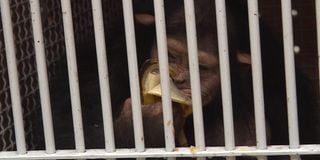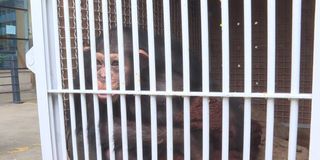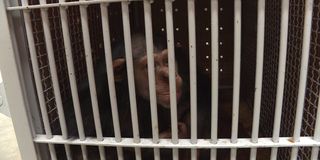Premium
Orphaned baby chimp Baran from Iran finds new home in Kenya

Orphaned chimp Baran from Iran is pictured at the JKIA in Nairobi ahead of her move to Ol Pejeta Conservancy in Northern Kenya.
What you need to know:
- Baran lost her mother at a tender age and there have been months-long campaigns to relocate her over unsuitable conditions at Tehran's Eram Zoo.
A wildlife conservancy in Kenya is the new home of an endangered baby chimpanzee from an Iranian Zoo.
This follows successful plans to relocate the four-year-old female but orphaned chimp known as Baran to Ol Pejeta Conservancy in Northern Kenya.
Baran lost her mother at a tender age and there have been months-long campaigns to relocate her over unsuitable conditions at Tehran's Eram Zoo.
Eram Zoo, which had contacted several international animal care centers, finally decided to send Baran to Kenya where she will live in a conducive environment and among her peers.
Environmental activists in Iran were worried about the health effects of the unsuitable conditions on Baran.
The young chimp had been struggling to cope with elderly apes who occasionally bullied her in the Middle East zoo.
The hostile environment, according to Iranian authorities, exposed Baran to a lot of physical and mental stress, denying her balanced development.
Zoo authorities said that after a long struggle, a decision was made to transfer the four-year-old to the Sweetwaters Chimpanzee Sanctuary in Kenya, which provides refuge to rescued, orphaned or abused young chimps.
A farewell ceremony for Baran was held last month in Eram Zoo, the main wildlife center in the Iranian capital.

Orphaned chimp Baran from Iran is pictured at the JKIA in Nairobi ahead of her move to Ol Pejeta Conservancy in Northern Kenya.
Baran happier
Dr Jafar Barmaki, the Iranian Ambassador to Kenya, says they decided to translocate the orphan chimpanzee to Sweetwaters to give her an environment where she can regain her health.
Baran’s translocation process, which began last year, was completed a month ago when the ape safely arrived at Jomo Kenyatta International Airport in Nairobi before being moved to Ol Pejeta.
Dr Barmaki said the chimpanzee is currently under a three-month quarantine in an exclusive area within the sanctuary to ensure she is disease-free before she can meet and mingle with other animals.
“Baran currently looks very happy and her appetite has improved,” Dr Barmaki said, adding that Baran was mainly surrounded by very elderly chimpanzees back in Eram Zoo, who were quite aggressive towards her.
Sweetwaters, which was established over 30 years ago, currently hosts 34 chimpanzees rescued from locations across the world.
Dr Stephen Ngulu, a wildlife veterinarian and head of Sweetwaters, says Baran will become an ambassador for her species and help raise awareness on the plight of chimpanzees across the continent.
“Baran will be in quarantine for 90 days, a period stipulated by the Kenya Wildlife Service. With 24-hour veterinary support and a stimulating quarantine enclosure, chimpanzees arriving at the sanctuary are carefully nursed back to health. She will be monitored as she adjusts to her new life,” said Dr Ngulu.
“While Baran’s story started with hardship, the future now looks better for this lucky chimpanzee. We hope the bright sun of Kenya will bring her a renewed experience amongst her kind.”

Orphaned chimp Baran from Iran is pictured at the JKIA in Nairobi ahead of her move to Ol Pejeta Conservancy in Northern Kenya.
Early life
Baran was born prematurely in 2017 at Tehran's main wildlife centre.
Baby chimps, according to vet experts, must spend at least five years with their mothers, but she was deprived of that.
Baran's mother was not able to fully bond with her when she was a bit older, and she was not accepted by the other chimpanzees.
After her mother died, Baran was moved into a cage for her own protection.
“Baran's relocation to Sweetwaters comes after months-long collaborative efforts among Ol Pejeta Conservancy, KWS, Iran in Kenya, Eram zoo and other animal welfare organisations,” said Ol Pejeta Conservancy.
Lack of other chimpanzees to socialise with can be harmful to both the mental and physical development of baby chimps.
Wild Chimpanzees remain endangered species of primates due to poaching, illegal wildlife trade, habitat loss, and climatic stress.
Statistics show that the population of wild chimpanzees has drastically dropped from about a million across 25 countries in Africa, in the turn of the 20th Century, to between 172,000 and 300,000 in six countries.





